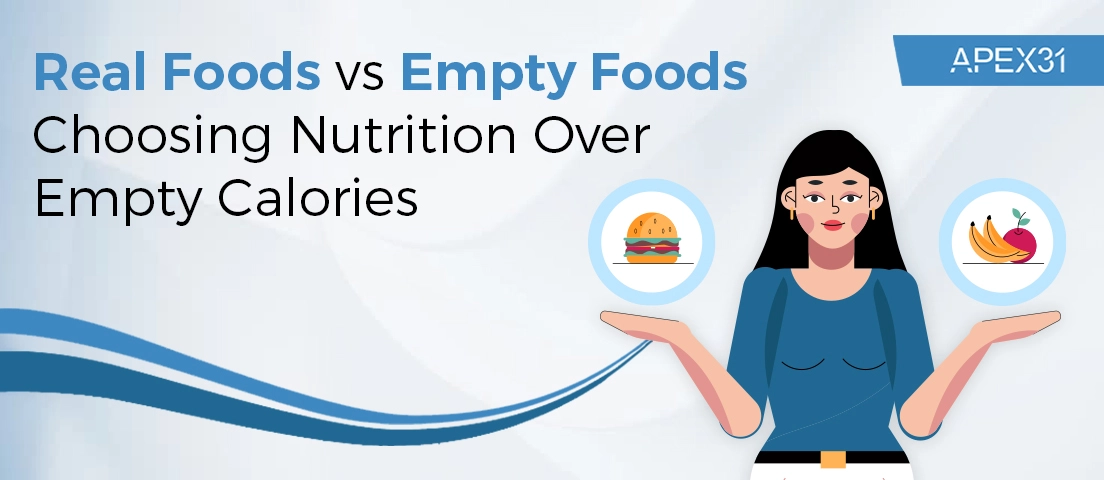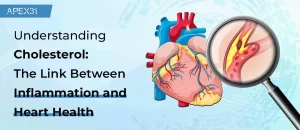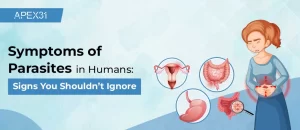Real Foods vs Empty Foods: Choosing Nutrition Over Empty Calories

There is no dearth of food products nowadays, especially in developed countries. However, the food choices that we make at the grocery store and at the dining table have become a lot more important. In fact, a lot of us are facing a paradox here, which is that there is an abundance of food, but there are many people who are suffering from nutrient deficiencies. The main cause behind it lies in a basic distinction between what we eat and the food items that our bodies actually require. In this blog post, you’ll get to know about the difference between real foods vs empty foods, along with why you should choose nutrition over empty-calorie foods. So, let’s begin!
The Main Difference: Nutritional Density
The core difference between real foods and empty foods is their nutritional density. The nutritional density refers to the concentration of nutrients in a single calorie. Real foods such as an apple, almonds, or any green leafy vegetable can be significantly nutrient-dense foods. An apple will provide fibre, vitamin C, and different antioxidants for a small number of calories. In a similar manner, a serving of spinach is a great source of iron, folate, and even vitamins A & K. These foods provide an amazing return on investment for your body. On the other hand, empty foods such as a can of soda, potato chips and even a sugary doughnut have the lowest nutritional density. They provide a large amount of calories, and they usually come from refined sugars and unhealthy fats without any beneficial nutrients. By consuming these foods, you will be satiated in terms of calories but still remain starved because of the lack of important micronutrients that are required. This deficit is bound to lead to several health problems over time.
The Impact on Energy and Metabolism
The type of food that we consume directly has an impact on our energy levels and metabolic function. Real foods, having complex carbohydrates, lean proteins, healthy fats and oils can provide a regular release of energy. A meal that is rich in whole grains and vegetables is digested slowly, which prevents the sharp spikes and crashes in blood sugar which are characteristic of empty-food consumption. This steady supply of glucose to your brain and muscles will make sure that you get consistent energy throughout the day. It will surely improve your focus and productivity. Empty foods have simple sugars, and they are quickly absorbed into the bloodstream. This influx of sugar can cause a considerable insulin response, which can lead to a temporary high followed by a dramatic crash. The effects on the blood sugar can make you feel quite sluggish, irritable, and even make you crave a lot more sugary foods. Over time, this repeated cycle can play its role in contributing to insulin resistance and an increased risk of type 2 diabetes.
The Role of Fibre in Satiety and Gut Health
Fibre is a non-digestible carbohydrate which can be found exclusively in plant-based foods, and they are quite important for the body. When we eat foods such as vegetables, fruits, legumes, and whole grains, their high fibre content provides a sense of fullness and even satiety. It helps in regulating the appetite and even prevents overeating, which is quite important for weight management. Empty foods that are highly processed don’t have any fibre at all. If you take an example of a sugary pastry, it doesn’t provide any fibre, which slows down digestion, and it can lead to a quick return of hunger. Beyond satiety, fibre plays a huge role in gut health. As a matter of fact, it acts as a prebiotic which feeds the beneficial bacteria in our gut microbiome. A healthy microbiome is often linked to everything from improved digestion to a stronger immune system to even better mental health. On the other hand, a diet that consists of empty foods and is low in fibre can disrupt the balance of gut bacteria. It can even lead to digestive issues and an impaired immune response, and there are many dangers of processed foods.
Real Foods & Disease Prevention
The link between a diet that is rich in real foods and reduced risk of chronic diseases is a well-established fact in the medical domain. The antioxidants and phytochemicals which are found in fruits, vegetables, and whole grains can combat oxidative stress and inflammation. Healthy fats from sources such as avocados, nuts, and olive oil are important for cardiovascular health. On the other hand, a diet that is high in empty foods is a big risk factor for different health issues. The trans fats and saturated fats that are present in processed snacks and fast food can raise LDL cholesterol, which can increase the risk of heart disease. The high sugar that is present in empty foods is linked to an increased risk of obesity, type 2 diabetes and even non-alcoholic fatty liver disease.
The Psychological & Emotional Connection
If you think beyond the physical benefits, choosing between real foods vs empty foods can have a huge impact on our psychological and emotional well-being. Eating real foods that are prepared from scratch can create a mindful relationship with what we consume. Cooking and eating nutrient-dense meals can be a source of immense pleasure and satisfaction. In fact, it can provide a sense of nourishment which is a lot more than the calories you eat. By opting for real foods, you are not just fuelling your body but also following a positive and sustainable approach to the diet of your choice. This mindful eating can even lead to a lot more mental clarity and a much more positive mood.
Conclusion
The distinction between real foods vs empty foods is not just a dietary trend but a fundamental principle of health and signifies the importance of real nutrition. Real foods are nutrient-dense, and they provide sustained energy and even prevent chronic diseases. On the other hand, empty foods provide just empty calories, which contribute to a variety of health problems. So, make a conscious decision in prioritizing whole foods that are unprocessed if you’re serious about taking your health into your control, as there are many whole foods benefits. It will prove to be an investment in a healthy future, which will ensure that you are free from the burdens of diet-related illness and the cycle of craving and deprivation. So, choose real foods in the battle between natural foods vs processed foods, and your health will be guaranteed for a long time to come because of a healthy eating lifestyle.



